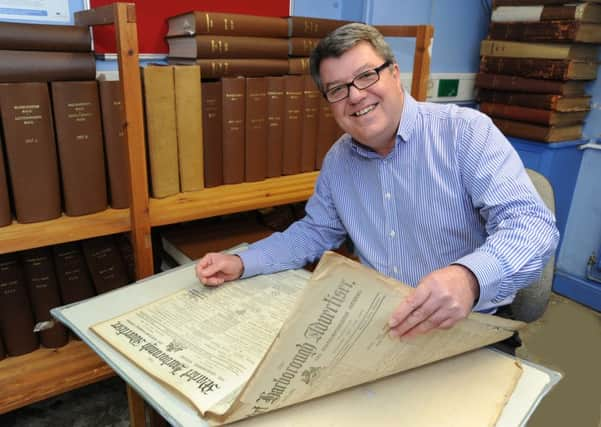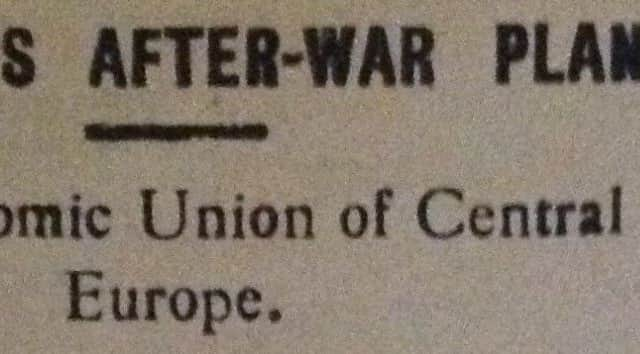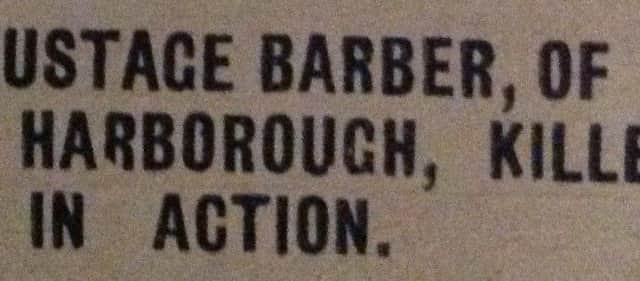JOHN DILLEY'S WWI BLOG: Pushing for peace


Peace talks brokered by neutral America are reported in the January 30, 1917, edition of the Market Harborough Advertiser.
President Woodrow Wilson says in an unusual speech to the Senate – the first since George Washington – that ‘we are much nearer a definite discussion of the peace which shall end the present war’.
Advertisement
Hide AdAdvertisement
Hide AdWilson is still pursuing his policy of neutrality but argues that ‘it is inconceivable that the people of the United States should play no part in the great enterprise of laying afresh and upon a new plan the foundations of peace among the nations’.


He adds: “The present war first must be ended and the peace must be a one which will win the approval of mankind, not merely serve the interests and aims of the belligerents.
“There must be not a balance of power but a community of power; not organised rivalries but an organised peace.”
With hindsight we now know that his proposals did not come to fruition and just a short time later – in early April – America decided its only course of action was to pitch in with the Allies. With that same hindsight we also know that it took another 18 months before the fighting actually came to an end.
Advertisement
Hide AdAdvertisement
Hide AdHowever, in this week’s momentous speech Wilson also tells the Senate that ‘the statesmen of the world must plan for peace, and nations adjust and accommodate their policy to it as they have planned for war’.


That type of foresight is clearly being demonstrated in another story reported in this week’s Advertiser under the headline Germany’s After-war plan – an economic union of central Europe.
The story is critical of the Allies who held a conference in Paris last summer, ‘however, since then nothing has been done’.
“On the other hand while we have been procrastinating our enemies have been acting. They are busy with formidable plans for the economic struggle which will assuredly follow the war.”
Advertisement
Hide AdAdvertisement
Hide AdIt appears as if Germany has plans for an alliance that sounds remarkably like today’s European Union, albeit with their Austro-Hungarian neighbours.


The story states: “According to a very interesting article which appeared the other day in The Times these decisions include recommendations for a Political Customs Union of the Central European States.
“Preferential treatment granted to one another by the Central European States is not in itself to justify claims for such treatment by other States.
“Separate commercial agreements which such other States are only to be permitted on condition ‘that they do not impair to any considerable extent the preferential treatment’ and that any ‘favoured treatment shall be agreed by both Austro-Hungary and Germany’.
Advertisement
Hide AdAdvertisement
Hide AdPerhaps a look back at history should be considered by Theresa May as she approaches the deadline for invoking Article 50 and Britain’s exit from the current European Union.


There is very little local war news in this week’s Advertiser but there is a short story about the death of one Market Harborough soldier.
Private Eustace Barber, 23, of Hearth Street has been killed in action. “He joined up at the outbreak of war and during the eighteen months he had been on active service he had been twice wounded. He had only returned to the firing line about a month ago.”
Barber had two brothers also fighting – Edwin of the 5 th Leicesters who has been wounded twice and returned to active service a week ago and Corporal F Barber of the 6th Leicesters.
Advertisement
Hide AdAdvertisement
Hide AdThere is also news of local men who have been injured. Sergeant Clarke of St Mary’s Road who is now in hospital in Stockport, and Private H Halst of Highfield Street, who is in hospital in France. He is only 19.
Private C Hillyer of the Leicestershire Regiment who had previously been reported as wounded is now officially reported as ‘wounded and missing’.
This column is published every Monday by John Dilley on the Newspapers and the Great War website and will continue until the 100th anniversary of the final armistice in November 2018.
My fellow researcher and De Montfort University lecturer David Penman is conducting a similar real-time project with the Ashbourne Telegraph. Check out his Great War Reports.